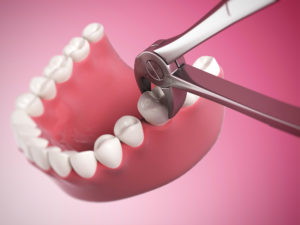
Over 10 million teeth are removed each year, according to the American Public Health Association. However, despite how common tooth extractions are, there are still many misconceptions about the procedure. Do you suspect you may have a decayed or damaged tooth or need to pull your wisdom teeth? Here is the truth behind five common myths about tooth extractions.
Myth #1: Tooth Extractions Are Painful
Many people worry that removing a tooth will hurt but that’s simply not the case. Before beginning the procedure, your dentist will numb the area to ensure you don’t feel any discomfort. While every extraction is different, the entire process usually takes just a few minutes. Though you may feel a bit of pain and discomfort afterward, this can be managed by taking prescription or over-the-counter medication as directed by your dentist.
Myth #2: Tooth Extraction Recovery Is a Long Process
In general, your tooth’s socket will take about one to two weeks to heal after a tooth has been extracted. However, you’ll likely be able to return to routine activities within 48 to 72 hours. You can help ensure a swift recovery by closely following aftercare instructions from your dentist.
Myth #3: Everyone Needs Their Wisdom Teeth Pulled
While wisdom tooth extractions are very common, not all third molars need to be removed. If your wisdom teeth erupt without causing any crowding or discomfort, your dentist may recommend leaving them. The only way to determine if you should get your wisdom teeth removed or not is to schedule a consultation with your dentist. They will perform a comprehensive oral exam that includes X-rays to decide on the best course of action for your oral health.
Myth #4: Extracting an Infected or Damaged Tooth Is Always the Best Option
Tooth extractions are often the treatment option of last resort. As a rule, it’s always better to try to save a tooth. Many damaged or infected teeth can be repaired with a root canal and dental crown. Root canals preserve as much natural tooth enamel as possible.
Myth #5: Replacing an Extracted Tooth Is Not Necessary
Even one missing tooth can lead to oral health problems. For example, your remaining teeth may begin to shift into the empty space, leading to bite problems or hygiene challenges. In addition, without stimulation from the missing tooth roots, your jawbone may begin to deteriorate, affecting your physical appearance and your ability to chew and speak correctly.
Are you worried about a damaged or infected tooth? Now that you know the truth behind these common extraction myths, don’t be afraid to talk to your dentist about whether you could benefit from tooth removal.
About the Author
Dr. Jeff Lee provides comprehensive oral care, including extractions, in the Muskingum Valley. A proud graduate of the Ohio State University, he also teaches at the university’s Oral and Maxillofacial Surgery Department in the OSU College of Dentistry. To learn more about tooth extractions, visit Dr. Lee’s website or call 740-432-8768.
